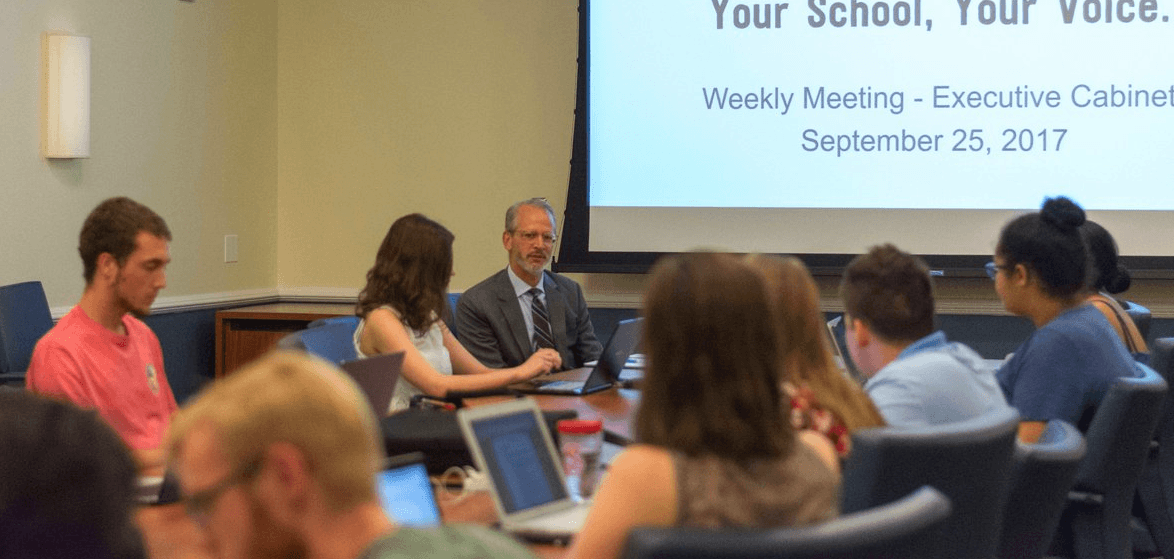Minorities feel underrepresented in SGA
6 min read
By GRACE WINFIELD
Senior Writer
On February 19, several minority clubs and groups attended a Student Government Association meeting and demanded that their voices be heard. According to the students, the answers they received in response to their concerns were far from reassuring.
“I showed up [to the meeting] ready to engage, but I felt as though the members of the executive SGA cabinet, well most, were not willing to do so and were actively trying to avoid many of the topics we were trying to bring up, such as hate speech on campus and taking responsibility in the wake of a national tragedy regarding gun violence,” said Alex Rudenshiould, who is currently running for SGA President. “It felt like they were trying to deflect from those points; I was frustrated.”
Rudenshiould was not the only student who felt disheartened after the meeting. Students of multiple minority groups on campus that voiced their demands, including Brothers of a New Direction (BOND), Black Student Association (BSA), and People for the Rights of Individuals of Sexual Minorities (PRISM), hosted an open forum as a result of the disappointing response they felt they received from SGA. The forum was meant to educate and inform students on campus of the issues they felt went unheard at the meeting, continuing to urge SGA and UMW to take initiative on the concerns of safety and diversity.
Sarah Karwowski, SGA President, says that at times it is difficult to appeal to the student body while maintaining the non-partisan approach SGA is expected to possess.
“My biggest responsibility is representing the voices of all students on campus, and it is a big challenge for my role specifically,” said Karwowski. “One of the hardest things is I have to be neutral at times because there’s a lot of different opinions, so I try not to choose one side or the other. I know for a lot of people that’s very frustrating, but when I’m representing a mass of students, I can’t choose sides.”
Some SGA members suggest that people of minorities that feel marginalized by the school and SGA should run for committee and senate positions to ensure their voices are heard, though there are also those amongst SGA members who disagree.
“I don’t think it’s their fault nor their responsibility,” Matt Good, SGA Director of Communications who is also running for SGA President, said about the suggestion. “It’s our responsibility to represent them.”
Rahima Morshed, a representative under the SGA’s Diversity and Unity Coordinating Committee (DUCC), says the reason she ran to be elected was precisely to enforce that poc’s like herself, as well as those of the LGBTQ community, concerns be heard and resolved.
“I personally have been dealing with my own issues in terms of diversity inclusion, more on the academic/student safety side, and I realized I wasn’t the only one, and I wanted to emerge myself in a situation where I can handle my problems, but address other students’ issues as well,” said Morshed.
Besides Morshed and a few others, the majority of the SGA and the executive cabinet are white students, leaving minority students feeling very underrepresented.
“I don’t believe the SGA represents the student body as a whole, but this isn’t necessarily the SGA’s fault,” said Jason Ford, BOND Vice President. “The majority of students aren’t aware, or just don’t care, that the SGA has a handle here on campus.”
Ford continued, “Most students don’t vote or take part in important administration to student handlings, for a lack of better term. I’m not saying there is no fault on the SGA. Their use of transparency and appeal to the student body is nowhere near optimal. SGA members must understand that the student body is more or less a social environment that has other concerns away from matters that in most cases directly affect them.”
Karwowski agrees that under the current system the SGA does not represent the student body.
“That’s why we did a constitution update because when I started my term, I knew about a lot of the inefficiencies in the constitution, so at the beginning of last semester, I put together a task force to get together to fix what wasn’t working.”
Leading that task force was Good, where he says he and five other team members held formal and informal focus groups to ask students about their main concerns and their relationship with the SGA. What they found was that many students did not know what the SGA was or how to get in contact with them, and that if they did, they still were not comfortable with turning to the SGA for help. With the data they acquired, the team decided to start entirely from scratch to create a constitution that would better appeal to student concerns, as well as creating a more efficient SGA.
Good also agrees that the SGA does not accurately represent the student body.
“For one, I think that because students have told me that they don’t feel represented,” said Good, referring to his interactions with concerned students. Good continues, “We currently have the DUCC, but under the current system they haven’t been supported as well, but the new system gives them power in the senate to push those concerns and ideas through. Hopefully, under the new constitution, SGA will more accurately represent the student body.”
Aside from the SGA, members of marginalized groups are even more disappointed with UMW administration and its statements and responses to recent events on campus, as well as national crises aforementioned, interpreting the university’s ambiguity as an attempt to preserve its image.
“Students felt the university wasn’t being clear on where it stood,” says Karwowski reflecting on her take from the February 19 meeting.
Students are being clear about what they want. “I want SGA to listen to us. I want SGA to bring our concerns to administration in a way which is not framing us as being a bother, but frames us as being legitimate concerns,” says Rudenshiould. “I want the SGA to be a center of power on campus, and not an extension of administration on campus, even if it is an association within the institution.”
Ford holds the school liable, saying, “I do believe UMW can do more to support people of color and the LGBTQ community. The choices this university makes creates its reputation, and handling incidents like the Patriot Front stickers is a clear choice that can sway this university’s reputation.” The incident Ford refers to is the recent surfacing of Patriot Front stickers, an American white supremacist group. Ford continued, “They’re showing support for all students, but with that, they are keeping an atmosphere of uncertainty and uneasiness for students who identify as minorities.”
Lillian Salamone, PRISM treasurer, contributed her opinion of the university’s recent responses.
“I feel like taking stronger measures to define the attitude that is or isn’t welcome on campus would help,” said Salamone. “The university talks a big game about diversity, but it feels like the action is lacking.”
The Office of the President and the SGA are currently hosting “UMW: Can we talk?” forums in hopes of strengthening the relationship between the student body, the SGA, and the administration.
“In the days and weeks right before Spring Break, as a result of several incidents on campus, students had shared a variety of concerns to several individuals who work on campus. I personally was feeling frustrated that I did not have more direct conversations with these students to hear and learn more about their UMW experience,” said President Paino when asked what initiated the forums. “At the same time, SGA had been receiving feedback on a variety of issues and was searching for more ways to engage students in important conversations.”
Paino continued on to say, “As a result of several conversations over the break, the administration and SGA agreed that we need to create more opportunities to have important dialogue. Therefore I am grateful that SGA agreed to co-sponsor these talks so I can have a more direct conversation with students about issues that concern them. I can only respond to student concerns if I gain a better understanding of where they are coming from. Understanding comes from listening first. I also am grateful for the opportunity to share information about what the administration is doing to respond to these concerns. Dialogue is so important in our ongoing effort to create a more diverse and inclusive learning community.”
The next forum is scheduled for March 27 at 7pm in Chandler Ballroom, and all students are encouraged to attend and contribute to the conversation.











